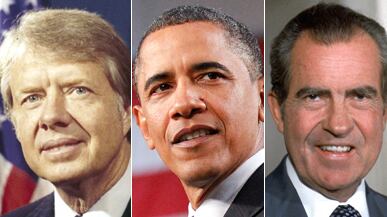No doubt the parts of President Obama's U.N. speeches in recent days will make the usual bloviators on the political right ratchet up the comparisons–always intended as derogatory– between the Obama and Carter presidencies. Even though Obama devoted at least half of his Thursday morning speech to blunt words about violence, terror, Islam, Pakistan, Iran, and the like, followed by praise of free markets and American leadership, nevertheless he did mention helping Africa and, yes, ended by talking about world peace. Any talk of solving the world's problems wholesale, especially those of the third world, is a gift to the comparison-mongers. They've had ample fresh incitement lately with the publication of President Jimmy Carter's White House Diary. Carter never misses the chance, it seems, to remind America of its moral turpitude while talking up his own joyless, grandiose do-goodery. But the Obama-Carter trope has a long pedigree, going back to the days of candidate Obama's jousts with his opponent Senator McCain, who warned that the country would get “Carter's second term” under Obama.
Let us, for argument's sake, take the comparison at face-value and examine its message and veracity. Historically, there has always been a tendency for a war-weary electorate to vote in a new leader to get on with the business of peace.
Postwar Britain astonishingly voted in Clement Atlee over Winston Churchill. In the U.S., voters chose Jimmy Carter to heal the country's post-Vietnam fissures, and one could argue that Bill Clinton was elected partly out of Cold War weariness as the country wanted to focus on the economic benefits of victory. The danger during such interludes is that the new administration neglects to keep defenses up and the nation strong against foreign rivals while over-agonizing about social injustices at home.
This has certainly been the traditional verdict on Jimmy Carter's term in office. The world sensed his weakness, the narrative goes, and enemies felt emboldened. While Carter defunded the CIA and the military, the Soviet Union felt free to invade Afghanistan and the Shah of Iran was toppled and replaced by the Ayatollah Khomeini. In short order, American embassy staff got taken hostage, a helicopter-borne rescue team ignominiously failed to reach its target, and all the while oil prices skyrocketed in the U.S. as OPEC grew in strength. There's a good deal of truth to the narrative: the facts speak for themselves.
But the narrative doesn't end there. The suggestion is that Carter's weakness was derived from his naïve idealism and messianic belief that he could change the world with good intentions, a weakness arguably connected to his particular brand of unworldly Christianity. It was generally held that Carter's worldview also included a puritanical sense of disgust over his own country's shortcomings and inequities. Hence his famous Independence Day, 1979, “malaise speech” in which he intoned drearily about “the growing doubt over the meaning of our own lives.” The combination of pessimism, Hamlet-esque agonizing, and doubt about American virtues all projected a fatal image of weakness abroad. They found an exact antidote in the character of Ronald Reagan–a sunny, optimistic extrovert with a faith in the moral strengths of the American system.

Apply this scenario to the Obama presidency and you can see where it leads. There are a few–only a few—points of similarity. President Obama is certainly trying to curb the military's expenditures—how could he not? He started out his tenure by talking directly and idealistically to the Muslim world. He has placed a great deal more emphasis on talk and diplomacy than the Bush administration did. He has put pressure on Israel to try harder with the Palestinians. On the domestic front, health-care reform furnished ample evidence, for those in search of such, of too much concern with grievances and not enough with national greatness. Above all, the president's dourness, his apparent pessimism—he would not use the word 'victory' in relation to Iraq—chimes with that of Carter. Ergo, Obama is Carter redux.
Unlike Carter, Obama is no outsider to the establishment bearing a grudge against the insider elites. Nor is he an incompetent idealist.
And yet it won’t hold up. On matters of substance the comparison falls apart. Unlike Carter, Obama is no outsider to the establishment bearing a grudge against the insider elites. Witness his tendency to appoint the likes of Timothy Geithner and Larry Summers to top posts around him. Nor is he an impractical idealist. If anything, he has disappointed his more purist supporters with a problem-solving realpolitik approach to pressing issues at home and abroad. Think the TARP bailouts passed by Bush but fully implemented under Obama; think the “reset” button with Moscow that has brought the Russians onboard with regards to the embargo against Iran. In Afghanistan, he ordered precisely the surge requested by the military while promising withdrawal down the line. The Obama era, so far, is all about repair and retrenchment. In that way, it bears a greater resemblance to the Nixon presidency than to the incompetent messianism of the Carter days which, in turn, seem more akin to the faith-based over-reaching visions of the Bush era. Both Bush and Carter succeeded only in underlining the limits of American power. President Obama is still trying to locate where those limits lie. We don't have a clear snapshot moniker for his tenure yet, but a second Carter he isn't.





